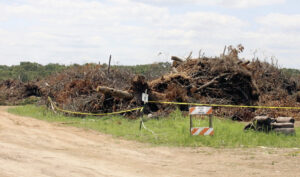When it comes to pending new regulations for waste-storage basins and tanks, size will make a difference.
Earthen basins the size of Denali Water Solutions’ Evans and Gideon lagoons, in Newton and McDonald Counties — which each have a storage capacity of about 15 million gallons — could be subject to tighter regulations if proposed legislation is signed into law by Governor Parson.
However, in Lawrence County, at a waste storage tank with a 1 million-gallon capacity, where Denali is operating “big time,” according to a neighboring resident, the tank’s comparatively diminutive size may exempt it from the same pending regulations, even though the types of materials stored in and transported from the containers are the same.
Combined Missouri House Bills 2134 and 1956, which will more tightly regulate storage vessels where processed wastes are commingled, was approved by the Senate last week, followed closely by a second round of approval in the House. The bill’s passage through legislature represented a win for the respective bills’ sponsors, State Rep. Ed Lewis, R-Moberly; State Rep. Dirk Deaton, R-Noel; and for State Sen. Jill Carter, R-Granby, who ushered the bill through the Senate.
HB 2134/1956 now awaits Governor Parson’s signature for it to become law.
The bill calls for the establishment of a nutrient management technical standard; annual testing of storage basin contents for metals, pathogens and other pollutants; graduated setbacks from surrounding structures, depending on the sizes of storage tanks; and groundwater monitoring on a site-specific basis.
“[The bill is a] step in the right direction,” said Vallerie Steele, who lives adjacent to the Evans lagoon, near Fairview.
For Kiman Kingsley, however — who operates a business a half-mile away from the storage tank near the community of Phelps in Lawrence County — the legislation may not make any difference.
An eleventh-hour, senate- substituted change in the text of HB 2134/1956 redefined “open waste storage vessels” from those with a minimum capacity of 1 million gallons to those with a minimum capacity of 2.5 million gallons. That adjustment may allow the Phelps tank, currently being operated by Denali, to slip beneath the bar.
Kiman Kingsley owns Hangar Kafe, located in a rural area west of Miller, a half-mile southwest of the storage tank. He takes a dim view of the practice of land-applying meat-processing sludge to farmland, and doesn’t use it on the 4,000 acres of organic corn, wheat and soybeans he grows.
The old Phelps storage tank, Kingsley said, was once used by his grandparents, who operated a dairy farm on the land where the tank is situated. Kingsley said his cousin now owns the property.
“Denali is hauling 50-75 tanker loads to and from the storage tank, around the clock,” said Kingsley, who is disturbed by the smell and the damage the trucks are doing to county roads.
“I see a truck drive by about every 20 minutes,” he said.
Kingsley, a congenial conversationalist, whose everyday attire is bib overalls and a jaunty railroad cap, has a knack for garnering information from the many patrons of Hangar Kafe. Most drive in by county roads and fly in via the airstrip which adjoins his café.
Kingsley said he talked to one of the contract drivers operating at the lagoon, who said Denali is dumping processing waste into the tank, then drivers are hauling it out of state. A dramatic increase in activity surrounding the Phelps storage tank, according to Kingsley’s sources, was connected with Denali’s storage basins in McDonald and Newton Counties being put on hiatus.
“Last year, I only saw about three trucks a week drive by here,” Kingsley said.
Kingsley’s connection in regards to basins to the southwest was spot on.
After the Missouri Fertilizer Control Board opted not to re-issue the company’s fertilizer permit on July 1, 2023, Denali – along with several other companies – operated under the DNR’s “enforcement discretion,” which basically amounted to grace. Denali fell from grace in November, when the DNR’s discretion was removed after Denali’s over-application of sludge to a farm in McDonald County in October 2023. The event was the most recent in a series of DNRrecorded over-applications by the company.
According to the subsequent Abatement Order of Consent (AOC) from the DNR, Denali was instructed to empty its lagoons and cease land-application of their contents, with contents to be either taken out of state or treated at an approved wastewater facility.
Heather Peters, with the Water Pollution Section of the Missouri Department of Natural Resources (DNR), said the Phelps tank is currently being operated by Denali under a permit issued to International Dehydrated Foods (IDF), based in Monett. As such, she said, “the Department does not have the authority to dictate contractual or other business decisions, including [the] subcontracting of land application to Denali.
“IDF would [currently] be responsible for addressing non-compliance with any permit conditions,” Peters said.
However, Peters said Denali has submitted its own permit application to operate that tank, with the intention of land-applying food and meat-processing waste and wastewater residuals to land in Lawrence and Jasper Counties.
According to the storage tank and land application management plan submitted to the DNR in conjunction with its permit application on March 5, Denali will be hauling waste in from a company as far away as California.
“If a permit were to be issued to Denali, I understand that IDF would terminate [its] permit and have land-application conducted under [Denali’s own] permit, or another facility permitted for similar operations,” Peters said.
According to the management plan for the Phelps tank that Denali submitted to the DNR, the company is proposing operations at the Phelps tank will be identical to those at its Gideon and Evans basins with one difference — the size of the containers.
The Gideon and Evans basins may be subject to pending regulations, whereas the Phelps tank may not be.







